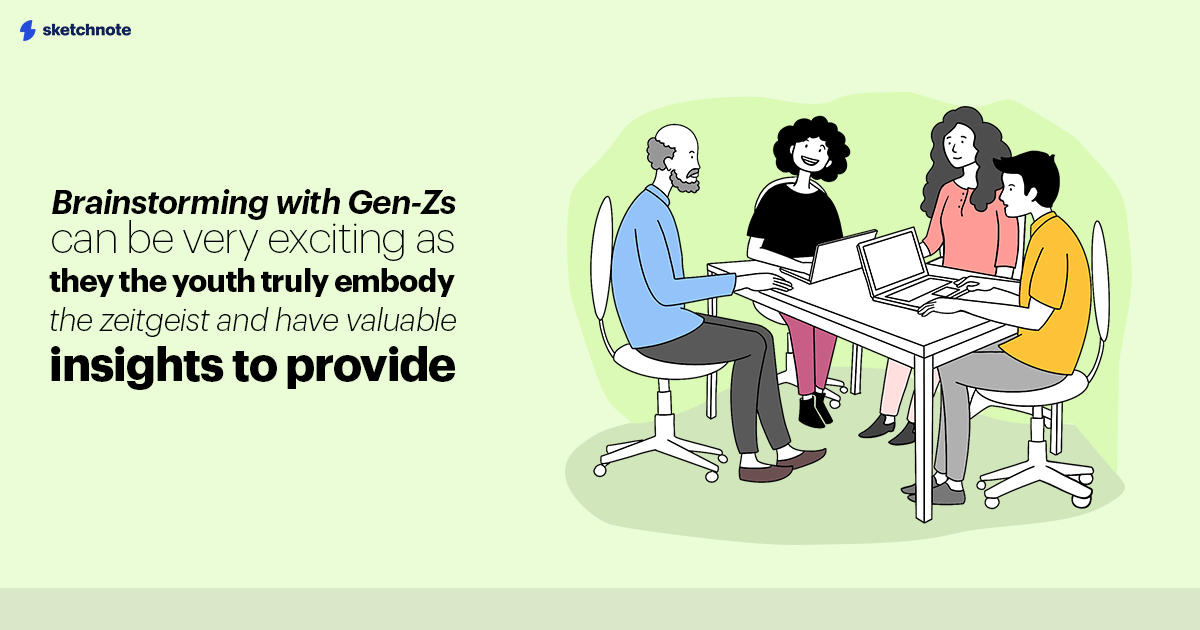Many managers shudder at the thought of having to lead Gen-Z employees these days. After all, there's a general tendency to believe that the Gen-Z workforce can be ungovernable and lacking in strong work ethics. A prominent strain of thought has also been along the line that this particular generation has extremely high expectations from the workplace atmosphere. This includes working set hours but with a more flexible schedule and drawing stricter boundaries around themselves.
While this might be a rather doomy assessment of this generation, there is a positive flip side to the Gen-Z dilemma that's engulfing corporations across the world today. Because besides the general perception that the upcoming workforce is rigid in their ways of needing a strict work-life balance, what's also true about the Gen-Z populace is that they are the most fluid and diverse generation to walk the halls of your office.
Research has shown that given a choice between a higher-paying but boring job versus a low-paying but interesting one, Gen-Z is a generation most split over the choice. This generation values pay substantially less than work that holds their attention. Their entrepreneurial spirit is also one to be boasted about. According to a recent study conducted by IPSOS, 29 per cent of Generation Z were ranked as having a very high entrepreneurial spirit, compared to 36 per cent of Millennials, 33 per cent of Generation X and 25 per cent of Baby Boomers.
All things considered, Gen-Z definitely possess a unique perspective on the term ‘career’. A Randstad research found that 42% of Gen Z workers would even take a pay cut if it meant working a job that makes a difference in the world, and 49% would not accept a job at a company that does not align with their values. This mindset brought forth a rather novel challenge before managers. But before we begin to address this unique predicament, let's understand who Gen-Z is.
Who are Gen-Z employees?
Demographically speaking, Generation Z or Gen-Z comprises those who are born between the mid to late 1990s to early 2010s. According to a Mckinsey study, what sets this generation apart is the importance they place on individual expression, beyond the confines of any stereotypes. They are a conscientious lot, seeking macro gains over individual ones. They are down to critically examining set practices and traditions.

Looking to create a conducive workplace for Gen Z Employees? Here is your go-to guide
Let's try to explore ways managers can play to Gen-Z's unique strengths, and nullify their weak areas, by attempting to understand them.
Create meaningful work opportunities
There are a lot of pressing issues that will directly impact the lives of Gen-Z in the near future. The climate crisis and the widening income inequity are just a few of them. And Gen-Z is hyper-aware of these issues and aims to actively work towards creating a better future. They also align themselves against any form of discrimination and support inclusion at all touch points. Gen-Z actively participates in these causes and prefers to engage with organizations that uphold similar values.
In order to not just attract and retain, but also to keep Gen-Z workers engaged, a higher sense of social responsibility is a must. Your company must communicate its commitment to social causes—and follow up on them—on a regular basis. Make this a touchpoint during recruitment processes to ensure Gen-Zs find meaningful careers in their sphere of work and can be the change they wish to see in the world.
Help them with stress management
Growing up in an age of the Great Recession of the 2000s has come with its issues. Research has shown that Gen-Z reports higher levels of anxiety and depression than most other generations. At the workplace, this stress can manifest itself as low productivity, frequent slip-ups and absenteeism. The first thing to do here is to acknowledge, as a company, that you're dealing with an incoming generation of workers that places mental health and overall well-being far higher than the previous generations did. They require flexibility to help with stress management while ensuring their tasks don't suffer.
By equipping them with tools to fortify their emotional intelligence too, managers can lay a solid foundation for their younger employees to deal with these challenges in their ways. Access to professional counseling, helping them manage their workload, and frequent catchups are great ways to ensure they're not over-stressed.
The Reporting tab for Sketchnote organizations can help you gauge your team's workload and employee bandwidth and assuage the situation before breaks occur due to overburdened workers.
Foster the spirit of collaboration
Diverse teams working together provide a wonderful opportunity to interact and understand each other. Gen-Z is quick to pick up on what the manager's expectations are from them when they see their peers abiding by them. It also helps staff from other generations understand their younger teammates better and break the communication barriers between them.
Brainstorming with Gen-Zs—especially through visual mediums and whiteboards—can be very exciting as they the youth truly embody the zeitgeist and have valuable insights to provide.
Help Gen-Z with skill development
Gen-Z finds value in learning and implementing marketable skills. They enjoy not just studying their own craft further but are also keen on trying their hands at adjacent skills that can enhance their knowledge further.
Working on your own skill development and mentoring programs can go a long way in keeping our younger peers engaged. By investing in Learning Management Solutions (LMS)—either in-grown or outsourced—your company can communicate its intent to participate in its employees' growth trajectory. This surely will get younger colleagues to stick around!
Allow for a flexible work environment
In the post-pandemic world, flexible work schedules have become more or less a norm. With hybrid working and work-from-home opportunities blossoming, people from older generations too have realized that it's possible to lead a highly fulfilling life without sacrificing your work. Gen-Z too comes from a school of thought that their diverse set of priorities can be better attended to through flexibility at work. This doesn't take away from their value as employees, but in fact adds to it.
From the flexibility of working remotely, or relying on more tech to do their job better, or even the flexibility of jumping career paths internally within the company, Gen-Z—and even many later Millenials—prefer the freedom to work in an increasingly complicated world. They aim to take more ownership of their work duties and put their best foot forward.
When it comes to fostering a flexible environment, you can create one by leveraging powerful collaboration tools and look to retain top talent. Real-time tracking of task statuses on workflow management platforms like Sketchnote helps to ensure the team stays accountable.
By appealing to the entrepreneurial spirit of your Gen-Z employees, you can successfully engage them. Assign them challenging tasks, give them the autonomy to solve problems their own way. And with your experience and guidance, they can prove to be valuable assets to your organization like none other!



